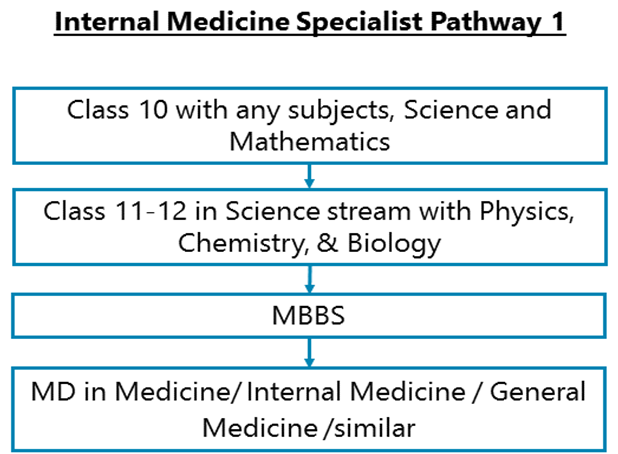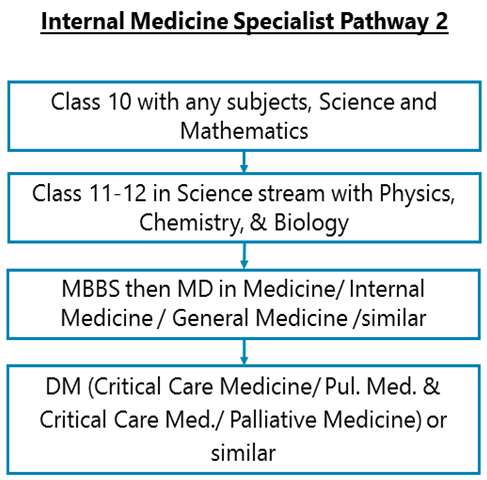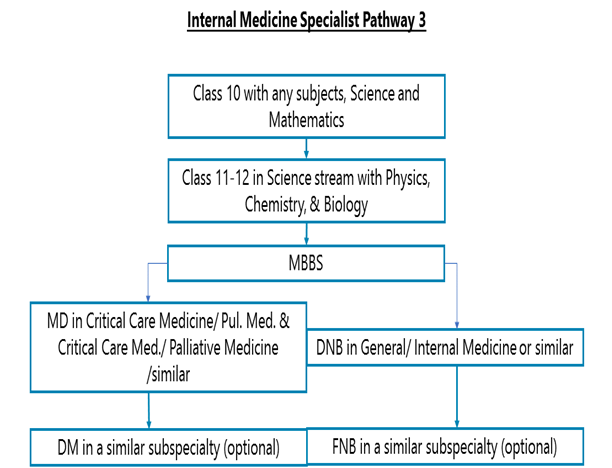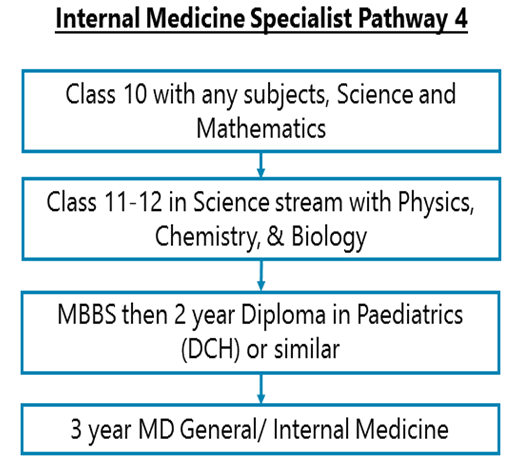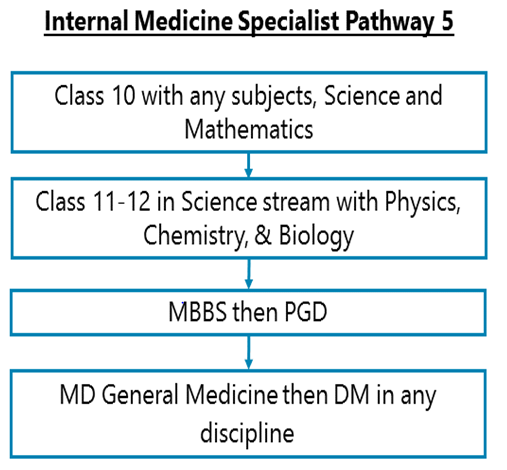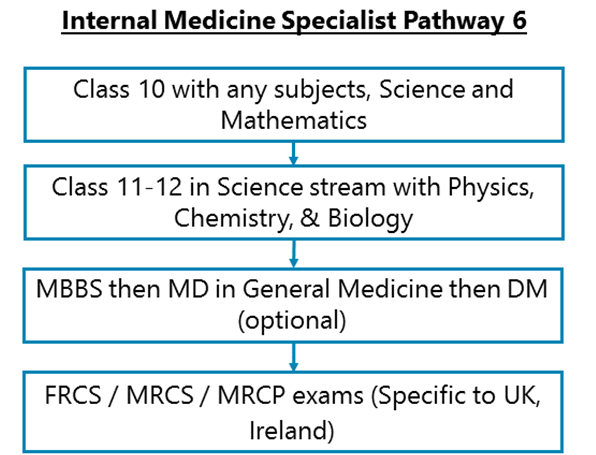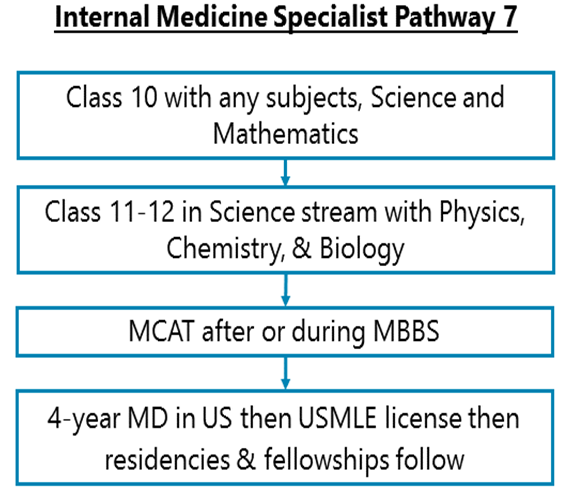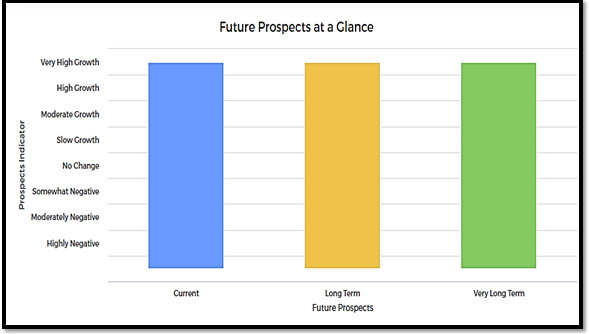Internal Medicine Specialist
Entry Level Qualification
Graduate
Career Fields
Medical Services
For Specially Abled




About Career
PARTICULARS | DESCRIPTION |
Name | Internal Medicine Specialist |
Purpose | Diagnose and Treat Adult Diseases |
Career Field | Allied & Para Medical Science |
Required Entrance Exam | NEET UG, NEET PG, AIIMS PG INICET |
Average Salary | 12,00,000 - 14,00,000 Rs. Per Year |
Companies For You | Apollo Hospitals, Fortis Healthcare, Max Healthcare & Many More |
Who is Eligible | Post Graduate |
1. Internist/ Internal Medicine Specialists treat patients who have undifferentiated or multi-system disease processes that single-organ-disease specialists may not be trained to deal with such as dyspnea, weight loss, fatigue, chest pain, confusion or change in conscious state. They attend to ambulatory or hospitalized patients and may as well play a major role in teaching & research.
2. They are dedicated to understanding and managing all aspects of the general health care of adults. They offer preventive care and disease prevention strategies to help patients maintain a healthy lifestyle.
3. They are specialists who are primarily associated with one or more healthcare establishments or a hospital or specialty clinics, and generally do not offer private independent care.
4. Internal Medicine Specialists do much of their work in hospitals since their patients are often seriously ill or require complex investigations and many of them specialize in the sub-specialty of Hospital Medicine. They may often have subspecialty interests concerning clinical conditions affecting particular organs or organ systems.
Some examples of clinical conditions Internists deal with are:
1. carotid artery disease (occurs when fatty deposits clog the blood vessels to your brain & head)
2. coronary artery disease (narrowing or blockage of the heart arteries)
3. hypertension
4. hyperlipidemia (acquired or genetic disorders that result in high levels of lipids)
5. peripheral vascular disease (causes the blood vessels outside of your heart & brain to narrow or spasm)
6. diabetes
7. thyroid & adrenal disorders
8. chronic kidney diseases
Pulmonary or respiratory disease states like
1. Asthma
2. Chronic Obstructive Pulmonary Disease (COPD)
3. Chronic Bronchitis
4. Emphysema
5. Lung Cancer
6. Cystic Fibrosis/Bronchiectasis
7. Pneumonia
8. Pleural Effusion
General internal medicine professionals are primarily focused on:
1. Comprehensive care for patients with undefined symptoms such as chest pain, shortness of breath, abdominal pain or back pain. Such patients need medical help in diagnosing their illness.
2. They conduct a general examination and orders tests and specialty consultations as needed. This includes preventive care, chronic disease management as well as care for acute medical conditions.
3. Collaboration, which means a patient may be referred to another doctor or a surgeon, including coordinating all tests and consultations
4. Preventive medicine care, such as Pap smears, mammograms, blood pressure screening and cholesterol screening
5. Communication with local doctors about successive therapies after a patient is discharged from hospital, which is especially important if she/he has one or more chronic medical illnesses, such as high blood pressure and diabetes.
Functional Fields of Work
1. Clinical / Diagnostic / Operative Care:
Work involves diagnoses, prognoses (how a disease progresses & assessing that progress) and treatment/therapy provided to patients suffering from clinical conditions affecting particular organs or organ systems including allergies, sinusitis, pharyngitis, arthritis, bone disorders and injuries, ulcers, high blood pressure, high cholesterol, coronary artery disease, congestive heart failure etc. Treatment could be done by surgery or through the administration of internal medicine.
2. Medical Research
1. You can pursue a career as a physician-scientist. Work will be completely laboratory based sometimes involving field collections of biological samples (human/animal). Depending on your interest, there are several different disciplines to choose from, including laboratory science, clinical research, and health services research.
2. Researchers often work at academic medical centers, for the pharmaceutical industry, or with the government. If you’re considering a research career, it will be important to maximize your research experiences during medical school.
3. You can do this by participating in a research project, taking a gap year for a research scholars program or other structured research experience, or participating in summer research internships.
4. For example, you may be board-certified in Internal Medicine (for a practice license) and an Associate Professor of Medicine as well, simultaneously you may also be a recipient of research grants from different sources and pursue scientific research on say, hand sanitizers (their formulation aspects, adverse effects, & regulations) or suppose colorectal cancer treatment if you are researching on the development of novel screening and therapeutic strategies or new therapies.
Education and Training:
Typically, in medical colleges and universities, all educators are involved in training and educating aspiring doctors. This includes operative techniques & experiences as well as theoretical lectures to develop a deep understanding of clinical and basic sciences surrounding Cardiac Sciences and its various sub-specialties including the principles of disease investigation, interpretation of diagnostic test results and employed technologies.
Key Roles and Responsibilities
As an Internist/ Internal Medicine Specialist, depending on your functional field of work, you will be engaged with one or more of the following roles and responsibilities: -
Clinical / Diagnostic / Operative Care:
1. You will be examining a patient (physical examination and primary screening) for diagnosis of and obtaining information on medical / physical conditions, history, and tendencies to ascertain necessary medical attention or required surgical procedures.
2. You will be diagnosing bodily disorders and clinical conditions and suggest therapeutic treatments, such as prescribing medicines or necessary surgeries, in hospital wards, clinics, or operating rooms.
3. You will be determining the nature of treatment, conferring with other medical professionals if required for or to obtain historical data to construct a patient’s medical portfolio and plan further treatment - advising throughout the prognosis (progression) of a disease.
4. You will be involved in recording patient’s condition or progress throughout the tenure of your treatment sessions, writing reports and maintaining proper registers containing patient information (case histories).
Medical Research:
1. You will plan, organize, coordinate & participate in scientific research projects, in collaborative work on study/experiment design, data analysis, & manuscript preparation for various scientific projects.
2. You will identify & implement strategies to enhance collaboration between investigators and clinical or research scientists.
3. You will recruit healthy & affected individuals for a period of close monitoring of their personal clinical response to disease stimulants or to obtain biologic samples from these participants for extensive analysis.
4. You will determine specific goals or objectives to be obtained; evaluate research data and develop & revise techniques or approaches to work problems.
3. You will function in a separate & independent manner in the design and initiation of research experiments.
4. You will design, develop or adapt equipment used in experiments or research to obtain desired results. You will be responsible for laboratory equipment and implementing safety procedures.
5. You will independently compose abstracts, technical reports, slide presentations, posters, spreadsheets, and manuscripts for submission to corporate and federal sponsors, conferences, and scientific journals.
4. You will produce medical illustrations, scientific posters, publication graphics, and slide presentations for national & international meetings.
Education and Training:
1. You will be involved in instructing / teaching to a class of students pursuing post graduate or higher levels or study in the fields of Internal Medicine or related disciplines.
2. You may demonstrate techniques or handling of instruments / tools to your students inside an operation theatre and counsel / guide students in performance of operative experiments.
3. You will participate in seminars, medical congresses, conferences across the world.
Career Entry Pathway
Class 10 with any subjects, Science and Mathematics – Class 11-12 in Science stream with Physics, Chemistry, & Biology – MBBS - MD in Medicine/ Internal Medicine / General Medicine /similar
After completing Class 11-12 in Science stream with Physics, Chemistry & Biology, you need to finish your graduation with a MBBS degree. Then go for MD in Medicine/ Internal Medicine / General Medicine /similar.
Class 10 with any subjects, Science and Mathematics – Class 11-12 in Science stream with Physics, Chemistry, & Biology – MBBS - MD in Medicine/ Internal Medicine / General Medicine /similar - DM (Critical Care Medicine/ Pul. Med. & Critical Care Med./ Palliative Medicine) or similar
After completing Class 11-12 in Science stream with Physics, Chemistry & Biology, you need to finish your graduation with a MBBS degree. Then go for MD in Medicine/ Internal Medicine / General Medicine /similar. Then go for DM (Critical Care Medicine/ Pul. Med. & Critical Care Med./ Palliative Medicine) or similar.
Class 10 with any subjects, Science and Mathematics – Class 11-12 in Science stream with Physics, Chemistry, & Biology– MBBS - MD in Critical Care Medicine/ Pul. Med. & Critical Care Med./ Palliative Medicine /similar or DNB in General/ Internal Medicine or similar
After completing Class 11-12 in Science stream with Physics, Chemistry & Biology, you need to finish your graduation with a MBBS degree. Then go for MD in Critical Care Medicine/ Pul. Med. & Critical Care Med./ Palliative Medicine /similar or you can go for DNB in General/ Internal Medicine.
Class 10 with any subjects, Science and Mathematics – Class 11-12 in Science stream with Physics, Chemistry, & Biology – MBBS – 2 year Diploma in Paediatrics (DCH) or similar – 3 year MD General/ Internal Medicine
After completing Class 11-12 in Science stream with Physics, Chemistry & Biology, you need to finish your graduation with a MBBS degree. Then go for a 2 year Diploma in Paediatrics (DCH) or similar followed by 3 year MD General/ Internal Medicine.
Class 10 with any subjects, Science and Mathematics – Class 11-12 in Science stream with Physics, Chemistry, & Biology – MBBS - PGD – MD General Medicine – DM
After completing Class 10 with any subjects, Science and Mathematics then Class 11-12 in Science stream with any subjects and Biology, you need to finish your graduation with a MBBS degree. Then you may go for 2 year Post Graduate Diploma (PGD) program followed by MD in General / Internal Medicine then DM in any discipline.
Class 10 with any subjects, Science and Mathematics – Class 11-12 in Science stream with Physics, Chemistry, & Biology – MBBS - MD in General Medicine – DM (optional) - FRCS / MRCS / MRCP exams (Specific to UK, Ireland)
After completing Class 11-12 in Science stream with Physics, Chemistry & Biology, you need to finish your graduation with a MBBS degree. Then you have to acquire MD degree in any discipline. Thereafter you may complete DM to specialize in a discipline. Then go for MRCP / MRCS / FRCS certifications. These exams are conducted in India at various locations.
Class 10 with any subjects, Science and Mathematics – Class 11-12 in Science stream with Physics, Chemistry, & Biology – MBBS– MCAT – 4-year MD in US - USMLE exam (specific to USA)
After completing Class 10 with any subjects, Science and Mathematics then Class 11-12 in Science stream with Physics, Chemistry, & Biology, you need to finish your graduation with a MBBS degree then appear for MCAT or appear for MCAT during / after your 2nd professional exam of MBBS course. MCAT is a NEET level exam. While you are completing your graduation degree, you will have to decide whether you want to obtain further education in the US or practice directly there. If you want to study further and then practice medicine or surgery in the US, you will have to first appear for the MCAT exam and finish the 4 year MD course there (equivalent to MBBS in India). In US, after MD there are Residencies and generally one does not get any more degree but obtain Fellowships after residencies (i.e. work experience). After your MD from an American medical college, you will have to appear for USMLE to obtain licensure for practicing as a medical professional in the US and start with a residency there.
Required Qualification & Competencies
1. After Class 11-12 & NEET (compulsory), you have to go for your Bachelor of Medicine and Bachelor of Surgery course (MBBS). Various forms of this qualification’s name are MB ChB, MB BChir, BM BCh, BMBS and MB BCh around the globe.
2. After your graduation, you have to go for a Master / post-graduation PG level program like MD, DNB and complete senior residencies to specialize in various branches of Oncology
3. DNB is considered equivalent to MD. The only difference is for MD you will be trained in medical colleges with hundreds of patients and for DNB you will be trained in big private hospitals with much lesser number of patients
4. After post-graduation, you can further proceed with FNB, DM or PDCC if you want to higher qualifications or obtain PhD if you want to be a physician scientist.
The MD specialties approved by the Medical Council of India are:
1. Anesthesiology
2. Aviation Medicine
3. Aviation Medicine/Aerospace Medicine
4. Bio-Chemistry
5. Bio-Physics
6. Blood Banking & Immuno. Haem./Imm. Haem. & Blood Trans.
7. CCM (Cerebral Cavernous Malformation)
8. Community Health Administration
9. Community Medicine
10. Dermatology
11. Dermatology , Venereology & Leprosy
12. Emergency Medicine
13. Family Medicine
14. Forensic Medicine/Forensic Medicine & Toxicology
15. General Medicine
16. Geriatrics
17. Health Administration
18. Hospital Administration
19. Immuno Haematology & Blood Transfusion
20. Lab Medicine
21. Marine Medicine
22. Maternity & Child Health
23. Medical Genetics
24. Medical Toxicology
25. Medicine
26. Microbiology
27. Nuclear Medicine
28. Obstetrics & Gynaecology
29. Ophthalmology
30. PSM (Preventive & Social Medicine)
31. Paediatrics
32. Palliative Medicine
33. Pathology
34. Pathology & Microbiology
35. Pharmacology
36. Pharmacology and Therapeutics
37. Physical Medicine & Rehabilitation
38. Physiology
39. Psychiatry
40. Pulmonary Medicine
41. Radio Diagnosis
42. Radio Diagnosis/Radiology
43. Radiology
44. Rheumatology
45. Skin & VD
46. Skin & VD & Lepxsy
47. Social & Preventive Medicine / Community Medicine
48. Sports Medicine
49. TB & Chest
50. Thoracic Medicine
51. Transfusion Medicine
52. Trauma and Critical Care Medicine
53. Tropical Medicine
54. Tuberculosis & Respiratory Diseases / Pulmonary Medicine
55. Tuberculosis & Respiratory Diseases/Medicine
56. Venereology
57. Anaesthesiology & Critical Care Med.
In the UK, MRCP / MRCS / FRCS is mandatory to practice as a Internist/ Internal Medicine Specialist.
1. You have to qualify graduation from any medical school (in UK or any other country including India), complete MD (if you are studying in India) and obtain your MRCP qualification from any of the Royal Colleges (Edinburgh, Glasgow, London).
2. For Medicine, there are 3 Royal Colleges that grant membership certifications: in Edinburgh, Glasgow and London.
3. MRCP exams are conducted by each college separately. So there are 3 different MRCP exams by 3 different colleges. Each exam has its own format that can be referred to from respective portals of conducting bodies.
4. You can appear for any MRCP exams from India. Exam centers in India include many cities such as New Delhi, Hyderabad, and Chennai etc. The fee for New Delhi is the lowest usually. The Indian locations are detailed on the individual websites of the 3 colleges (the dates are subject to change but the specialties and locations are not)
5. Aiming the UK, it will be most profitable of you also earn registrations with established bodies such as AHCS (The Academy for Healthcare Science), RCCP (The Registration Council for Clinical Physiologists), or HCPC (Health and Care Professions Council).
6. If you are targeting US or Canada, remember, you will have to clear USMLE after you complete an MBBS program in India to be able to directly practice in the US. To study in medical schools in USA or Canada for an MD degree before practicing there, you will have to clear MCAT. Medical College Admission Test (MCAT) is a compulsory test for anyone who plans to get admission in medical schools of USA and Canada. MD degrees are followed by 3 to 7 years of residency. Graduates can practice any specialty. Physicians are fully certified after passing board exams. 152 MD-granting schools in the United States and 17 in Canada.
7. MCAT consists for 4 distinct sections which are individually scored. Each section is allotted either 90 or 95 minutes and tests between 50 and 60 questions. Including breaks, the full examination lasts approximately 7.5 hours.
8. Most MBBS graduates go for further study by passing MCAT, completing 4- year MD in US or Canada and then appearing for USMLE because this way is easier. However, some MBBS graduates avoid this path and directly aim at USMLE from India but cannot succeed as they lack US-based education which is extremely essential in order to pass USMLE.
9. MCAT is administered 25 times in a year. With a pass in MCAT, they will need to complete a medical degree (MD) in the US or Canada which is for 4 years. Then they can appear for USMLE and get a practice license.
10. Remember: after passing USMLE once, you cannot repeat it for attempting a better score. Programs usually eliminate candidates with multiple attempts. For this reason it is essential to do extremely well in the first attempt. Further, your answers will not be evaluated on a population curve basis; you will be marked on the level of difficulty of the items you have attempted during the examination.
11. Graduates from any other stream in India (other than MBBS) are also eligible to practice as a Medical Professional in the US but they have to appear for MCAT with a ‘special permission’ from Association of American Medical Colleges (AAMC) (before registering for the exam, mail to mcat@aamc.org stating the reasons why you wish to take the exam). If you are specially permitted by AAMC, which is rare, you can then attempt & clear MCAT, then pass 4-year MD, then clear USMLE and then practice in US / Canada.
So, in short
MBBS in India > MCAT > Basic Medical Degree in US / Canada (MD) > USMLE >Practice
Alternatively, a tougher router is,
MBBS in India > USMLE >Practice
For non-medical graduates from India,
Bachelor degree (duration is not a factor) > MCAT with special permission> Basic Medical Degree in US / Canada (MD) > USMLE >Practice
MINIMUM EDUCATION REQUIRED | MAXIMUM EDUCATION REQUIRED |
Post Graduate Postgraduate Degree / Diploma / Certificate Programs for which the minimum eligibility is a pass in Graduation / equivalent Diploma program like Honours Diploma or Graduate Diploma. | Post-Doctoral Post Ph.D. programs for which the minimum eligibility is a Doctoral degree. |
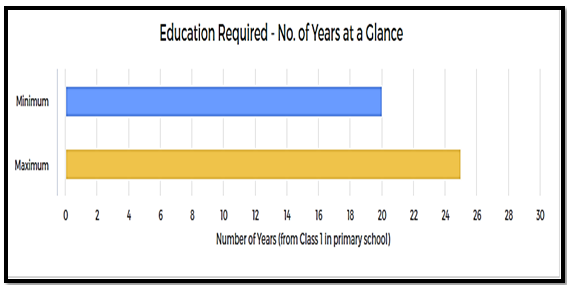
Competencies Required
Interests
1. You should have an interest in Investigative Occupations. Investigative occupations involve working with ideas and quite a lot of thinking, often abstract or conceptual thinking. These involve learning about facts and figures; involve the use of data analysis, assessment of situations, decision making and problem-solving.
2. You should have an interest in Realistic Occupations. Realistic occupations involve more practical and hands-on activities than paperwork or office work. Realistic occupations often involve physical activities for getting things done using various tools and equipment.
3. You should have an interest in Social Occupations. Social occupations involve helping or assisting others; these involve working with and communicating with people to provide various services; these may involve educating and advising others.
Knowledge
1. You should have knowledge of Medicine - the science of diagnosis, treatment and prevention of human diseases, ailments, injuries and disorders. This includes understanding the symptoms, knowledge of the diagnostic processes, knowledge of the treatment procedures and medicines, and preventive healthcare measures.
2. You should have knowledge of Healthcare Science and Services - different fields that are related to offering various types of healthcare services to people; assisting physicians and surgeons to carry out diagnosis, treatment and prevention of human diseases, ailments and disorders. This includes knowledge of different practices apart from medicine which are used to treat and prevent human diseases or to provide holistic healthcare and wellness. This also includes knowledge about drugs and medicines.
3. You should know Biological Sciences - humans, their anatomical structure, cell structure, tissues, physiological functions, evolution, and all other related aspects.
Skills
1. You should have Active Listening Skills - Giving full attention to what other people are saying, understanding the points being made by others, asking questions, etc.
2. You should have Critical Thinking skills- Skills in the analysis of complex situations, using logic and reasoning to understand the situations and take appropriate actions or make interpretations and inferences.
3. You should have Reading Comprehension Skills - Skills in understanding written sentences and paragraphs in work-related documents.
4. You should have Instruction Skills - training others how to do something.
5. You should have Judgment and Decision-Making Skills - considering the pros and cons of various decision alternatives; considering costs and benefits; and making appropriate and suitable decisions.
6. You should have Problem Solving Skills - Skills in analysis and understanding of problems, evaluating various options to solve the problems and using the best option to solve the problems.
7. You should have Persuasion Skills- persuading others to change their minds or behavior.
Ability
1. You should have Oral Comprehension Ability - listen to and understand information and ideas presented through spoken words and sentences.
2. You should have Oral Expression Ability - communicate information and ideas in speaking so others will understand.
3. You should have Deductive Reasoning Ability - apply general rules and common logic to specific problems to produce answers that are logical and make sense. For example, understanding the reasons behind an event or a situation using general rules and common logic.
4. You should have Problem Sensitivity - The ability to tell when something is wrong or is likely to go wrong. It does not involve solving the problem, only recognizing there is a problem.
5. You should have Inductive Reasoning Ability - The ability to combine pieces of information from various souces, concepts, and theories to form general rules or conclusions. For example, analysing various events or sitations to come out with a set of rules or conclusions.
6. You should have Near Vision - The ability to see details at close range (within a few feet of the observer).
7. You should have Perceptual Speed - The ability to quickly and accurately compare similarities and differences among sets of letters, numbers, objects, pictures, or patterns. The things to be compared may be presented at the same time or one after the other. This ability also includes comparing a presented object with a remembered object.
8. You should have Arm-Hand Steadiness - The ability to keep your hand and arm steady while moving your arm or while holding your arm and hand in one position.
Personality Traits
1. You are always or mostly careful about your actions and behavior.
2. You are always or mostly disciplined in your actions and behavior.
3. You are always or mostly a soft-hearted person.
4. You are always or mostly helpful to others.
5. You are always calm or generally remain calm in most situations.
Career - Job Opportunities & Profiles
In India, after a DM you can get a job as a Consultant in any of the following healthcare establishments:
1. Multi-Specialist Government and private hospitals such as All India Institute of Medical Sciences (AIIMS), Christian Medical College, Apollo, Fortis, Narayana, Kasturba, Tata, Lilavati, Medanta, Kokilaben, King Edward Memorial, Max, Wockhardt, Sterling, Shalby, Medica, King George, Assam Medical College, Columbia Asia, Jaslok, AMRI, and so on.
2. You may also consult patients at various health clinics.
3. Most jobs for Specialist Consultant Physicians are contractual. Many of the Consultants work in more than one hospital.
4. If you want to pursue a career in teaching along with practice (practice means you will be involved in treating patients), you may join a teaching hospital as an Associate Professor, generally referred to as Medical College and Hospital such as the AIIMS, St. John, Kasturba Medical College, Maulana Azad Medical College, King George’s Medical College, Christian Medical College Vellore, Grant Medical College, Calcutta Medical College, Lady Hardinge Medical College, etc. In India, generally an alumnus of a medical college is absorbed into the faculty of the college after their Senior Residency in that college itself.
5. If you want to pursue a career in Medical Research along with practice (practice means you will be involved in treating patients), then you may join any of the medical colleges which are involved in research such as the AIIMS, JIPMER Pondicherry, Institute of Medical Sciences, BHU, University College of Medical Science, Delhi University, Sri Ramachandra Medical College & Research Institute, Regional Medical Research Centre at Bhubaneswar and Dibrugarh, PGIMER, Chandigarh, IPGMER, Kolkata, etc.
Specialisation Tracks In This Career
1. Internist (Community Internal Medicine)
Community Internal Medicine specialists play a significant role in providing local communities with the expertise, knowledge and strength.
2. Internist (Adolescent medicine)
Adolescent medicine Specialists focus on patients in the adolescent period of development. This period begins at puberty and lasts until growth has stopped, and when adulthood begins.
3. Internist (Hospital medicine)
Hospital medicine is a medical subspecialty which deals with the care of acutely ill hospitalized patients.
4. Internist (Allergy, Asthma and Immunology)
Some Internists can specialize in clinical conditions like allergies, asthma and immunological modalities of treatments of various infections.
5. Internist (Clinical cardiac electrophysiology)
Doctors specializing in this sub-specialty focus on the study and treatment of rhythm disorders of the heart. They assess your heart's electrical system or activity and diagnose abnormal heartbeats or arrhythmia.
6. Internist (Gastroenterology)
This subspecialty is concerned with the field of digestive system disorders.
7. Internist (Geriatric Medicine)
This branch focuses on healthcare of the elderly people. There is no stipulated age when a patient needs the care of a specialist geriatrician.
8. Internist (Interventional cardiology)
This subspecialty specifically deals with catheter-based treatment of structural heart diseases. For example, the interventional cardiology procedure of primary angioplasty is now the gold standard of care for an acute myocardial infarction (commonly known as heart attack).
9. Internist (Hematology)
This is the branch concerned with blood, the blood-forming organs and its disorders.
10. Internist (Sleep medicine)
Doctors specializing in this discipline are devoted to the diagnosis and therapy of sleep disturbances and disorders.
11. Internist (Sports medicine)
This branch of medicine deals with physical fitness and the treatment and prevention of injuries related to sports and exercise.
12. Internist (Transplant hepatology)
Transplant Hepatologists receive advanced training in gastroenterology and focus on the management of advanced liver disease.
13. Internist (Infectious disease)
This subspecialty is concerned with disease caused by a biological agent such as by a virus, bacterium, parasite or other etiological agents like prions etc.
14. Internist (Medical oncology)
Medical Oncologists deal the immunotherapeutic (immunological) and/or chemotherapeutic (chemical) treatment modalities of cancer.
15. Internist (Nephrology)
Nephrologists deal with the study of the function and diseases of the human kidney.
16. Internist (Pulmonology)
Pulmonologists deal with diseases of the lungs and the respiratory tract
17. Internist (Rheumatology)
Rheumatologists primarily deal with immunity related disorders of the musculoskeletal system, soft tissues, autoimmune diseases, and/or inherited connective tissue disorders.
Career Growth
1. In hospitals, if you are engaged as a practicing Consultant, there is no growth as such in terms of job positions, except being called a Senior Consultant. However, in teaching hospitals, if you are engaged in teaching along with practice, you may grow from an Associate Professor’s role to a Professor and then to a Senior Professor.
2. If you are engaged at a medical research institution, you may grow from the position of a Senior Scientist to that of a Principal Scientist, then to a Deputy Director and Director.
Salary Offered
1. After your DM, as a specialist Consultant Internist, you will be getting about Rs. 1, 00,000-1, 30,000 a month to begin with at a Government hospital. At private hospital, you may get about Rs. 1, 50,000-2, 00,000 or even more a month depending upon your experience.
2. Remember that by the time you complete a DM, you will have at least 8 years of practice experience, first as a junior resident (3 years during MD), then as a senior resident (3 years during DM) and considering 1 year gaps between MBBS and MD and then another 1 year gap between MD and DM). In most cases, however, it takes at least 10 years to complete a DM.
3. With about 2-5 years post qualification experience (after DM), you will be making about Rs. 1, 20,000 – 3, 00,000 or more per month.
4. With about 6-12 years post qualification experience (after DM), you will be making about Rs. 1, 80,000 – 5, 00,000 or more per month.
5. Senior Specialist Consultants with about 15-20+ years post qualification experience (after DM), you will be making about Rs. 2, 50,000 – 12, 00,000 or more per month.
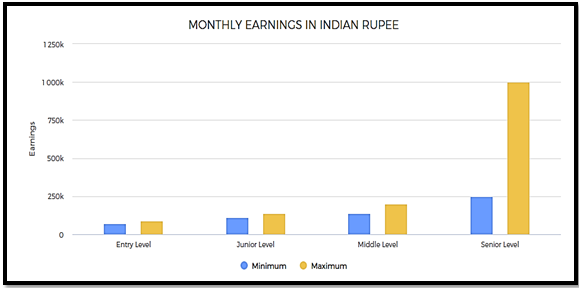
Monthly Earning In Indian Rupee
Entry Level | Junior Level | Mid-Level | Senior Level | |||||
Min Earning | Max Earning | Min Earning | Max Earning | Min Earning | Max Earning | Min Earning | Max Earning | |
70000 | 90000 | 110000 | 140000 | 140000 | 200000 | 250000 | 1000000 | |
1. Entry level: 0 - 2 years of work experience
2. Junior Level: From 1 to 12 years of work experience
3. Mid-Level: From 5 to 20+ years of work experience
4. Senior Level: From 10 to 25+ years of work experience (there could be exceptions in some high-end technical, financial, engineering, creative, management, sports, and other careers; also shortly, people will reach these levels much faster in many careers and in some careers, these levels will have no meaning as those careers will be completely tech skill driven such as even now, there is almost no level in a Cyber Security Expert’s job)
Work Activities
1. Analysing and interpreting data and information - Analysis of data and information to find facts, trends, reasons behind situations, etc.; interpretation of data to aid in decision-making.
2. Assisting and caring for people - Assisting people in availing of services; taking care of people in different situations; offering help and services to others.
3. Communicating with co-workers and others - Communicating with people in writing, verbally or otherwise inside your workplace and various other people who have professional relationships with your place of work including vendors, government officials, etc. or with people at large
4. Developing and maintaining interpersonal relationships - Developing professional relationships with co-workers and others outside organisations and maintaining good relationships.
5. Getting Information and learning - Observing, hearing, and reading, using computers, or otherwise obtaining information and learning from it.
6. Inspecting situations, events, and people - Inspecting situations, events and people to understand the reasons and causes for the situation or events to happen; inspecting people to understand reasons behind their behavior and actions
7. Making decisions and solving problems - Analysis of data and information; evaluation of alternative decisions and results of decisions; taking the right decisions and solving problems.
8. Processing information - Compiling, tabulating, calculating, auditing, verifying or otherwise dealing with information processing including data entry, transcription, recording, storing and maintaining databases
9. Providing advice and consultation to others - Giving advice or consultation to others about various issues, conceptual matters, know-how, scientific matters, products or services
10. Strategic planning - Developing visions and goals, developing strategies and action plans for achieving visions and goals.
11. Updating and using relevant knowledge - Keeping updated with the latest knowledge relevant to your fields of work and use of the relevant knowledge in getting things done.
12. Using computers for work - Using computers for day-to-day office work; using computer software for various applications in day-to-day professional work; entering data and processing information; for writing.
13. Working directly with people - Working directly with people to offer them products and services, providing assistance, etc.
Future Prospects
1. The future of this pathway seems bright as the industry statistics are encouraging. The Healthcare Market in India has a potential to increase 3 fold to 133.44 billion US Dollars. Indian Government is willing to expand public health spending to 2.5% of GDP by 2025. Pradhan Mantri Jan Arogya Yojana (PMJAY) launched in 2018 provides 7,124.54 US Dollars each to over 100 million families every year.
2. Then tire Healthcare Industry in India is one of the fastest growing sectors and it is expected to reach $280 billion. The major focus is on quality of service and hence skilled labor is much required to sustain growth of this industry.
3. The Services Sector (including community, social and personal services) is the key economic growth driver in India. It is the dominant sector in India’s GDP, has also attracted significant FDI (Foreign Direct Investment) in 2018 itself and generated large scale employment opportunities.
4. By 2025, medical spending in India is expected to grow by almost 9 to 12% making India one of the world’s top ten in this zone. India’s earnings from medical tourism could exceed US$ 9 billion.
5. The Indian Life Sciences industry will sustain its growth trajectory of 11 to 12% and grow 7 to 8 times to a size of USD 190 billion to 200 billion by 2030. The industry will also create nearly 4 million new jobs for the country.
6. Overall, R&D spend from pharma and biotech companies is expected to be USD 177 billion in 2019, compared to about USD 171 billion in 2018. Biotechnology products are expected to contribute steadily to sales rising to 52% of the top 100 product sales.
Future Prospects At A Glance
Current (0-1 year) | Long Term (2-5 year) | Very Long Term (6-10 years) |
Very High Growth | Very High Growth | Very High Growth |

